Are you wondering if your tattoo will get darker when it heals? Many tattoo enthusiasts often ask this burning question. Fortunately, there are some simple things you can do to find out if your tattoo will get darker when it heals. In this article, we will discuss what you can do to determine if your tattoo will darken when it heals.
Contents
What to Consider Before Getting a Tattoo
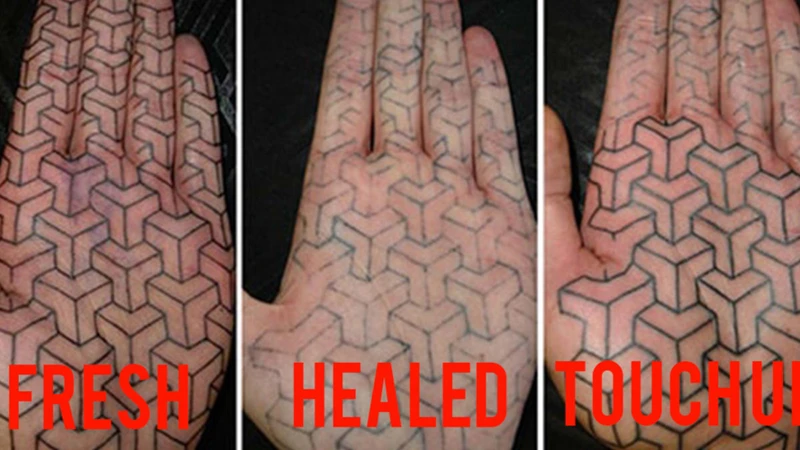
Before getting your tattoo, it is important to consider how long the tattoo will last, how much it will cost, and whether it will fade when it is healing. It is important to research and ask questions to ensure that you will be happy with your tattoo for years to come.
Tattoo Design: When planning your tattoo, consider the design carefully. Choose a tattoo design that is meaningful and complements your style. It is best to avoid complex and intricate designs, as they are more prone to fading when healing and are more expensive to get.
Tattoo Placement: Placement is an important factor to consider when getting a tattoo. Placement affects the visibility and longevity of your tattoo, so it is important to choose a location that you are comfortable with showing off. Areas such as the arms and chest are more likely to fade and blur when healing than other areas, such as the back and legs.
Tattoo Cost: The cost of a tattoo varies depending on the size and complexity of the design. Be sure to research the cost of a tattoo in your area and budget accordingly.
Do Tattoos Fade When Healing? Depending on the tattoo artist and the design, some tattoos may fade when healing. Larger, more intricate designs are more likely to fade than simple designs. It is important to have your tattoo touched up if it begins to fade after it is healed.
How Does the Tattoo Healing Process Work?

Tattoos are created by injecting ink into the dermis, the second layer of skin. It is during this healing process that the tattoo may appear lighter. This is due to the body’s natural healing process in which the cells of the dermis regenerate, pushing the ink to the surface. As the cells continue to reproduce, they push more ink to the surface, causing the tattoo to darken.
The healing process typically takes two to four weeks. During this time, the body will naturally expel the excess ink and skin cells. This can cause the tattoo to look lighter and less crisp. In addition, the sun can cause the skin to heal unevenly, which can lead to patches that appear lighter than the rest of the tattoo.
It is important to keep the tattoo clean and moisturized during the healing process to avoid infection and ensure a good outcome. Avoid direct sunlight and wear sunscreen to protect the tattoo from fading.
In some cases, a tattoo may appear light even after the healing process is complete. This is usually due to the type of ink used or the depth of the ink. Lighter colors, such as pink and yellow, tend to fade faster than darker colors. It is also important to note that some tattoos may never darken, regardless of how long the healing process takes.
If you are wondering why does my tattoo look so light, it is important to understand the healing process. By taking the proper steps during the healing process and protecting the tattoo from fading, you can ensure that your tattoo will look its best when it is healed.
Does a Tattoo Fade During the Healing Process?

Tattoos that appear lighter when healing is a common concern for many people considering getting one. It is a natural fear that your tattoo will look different once it is healed, and some people worry that a tattoo can actually fade during the healing process.
The good news is that tattoos do not fade during the healing process. The appearance of a tattoo being lighter during the healing process is actually quite normal and should not be a cause for concern.
The following are the reasons why a tattoo may look lighter when healing:
- Ink Migration – During the healing process, the top layer of skin sheds and the ink can spread to other parts of the skin, making the tattoo appear lighter.
- Scarring – When your tattoo is healing, it may form small scabs and the scabs can draw some of the ink out of the tattoo, making it look lighter.
- Swelling – Swelling of the tattooed area can cause the ink to appear lighter. This is especially true if the tattooed area is raised or if the person is swollen due to an allergic reaction.
Once the healing process is complete, the tattoo should return to its original color. In some cases, the tattoo may be slightly darker due to the ink settling into the skin. It is important to remember that the healing process can take several weeks and it is important to be patient and let your tattoo heal properly.
If you are still concerned that your tattoo is fading during the healing process, it is important to speak to your tattoo artist or a doctor. They will be able to advise you on the best course of action and provide guidance on how to ensure that your tattoo heals properly.
Will My Tattoo Get Darker When It Heals?
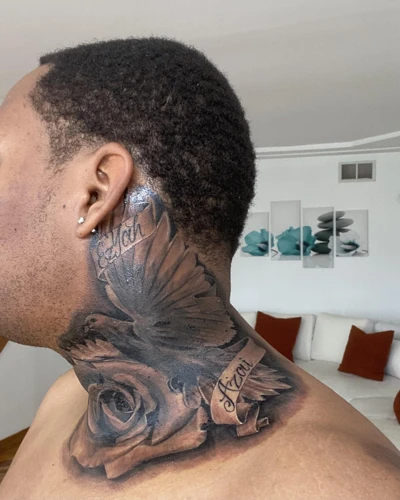
The answer to this question is: yes, it’s likely that your tattoo will become darker when it heals.
The way tattoos heal and the way the ink settles into the skin is different for everyone, so it’s hard to predict how dark your tattoo will become. However, generally speaking, most tattoos will get darker as they heal.
Here’s why:
| Before Healing | After Healing |
|---|---|
| The top layer of skin is intact | The top layer of skin is gone, exposing the deeper layers |
| The ink is held on top of the skin | The ink has settled deeper into the skin |
| The tattoo appears brighter | The tattoo appears darker |
As the outer layer of skin is removed, the ink is exposed to more light and air, making it appear darker and more vibrant. Additionally, as the skin heals, the ink will settle deeper into the dermis, appearing darker and more saturated.
It’s important to note that the colors of your tattoo may also change as it heals. If you have a colored tattoo, the colors may become more vivid and intense as the healing process progresses.
The healing process can take anywhere from two to four weeks, and the final color of your tattoo may not be apparent until then.
Why Does My Tattoo Look So Light?
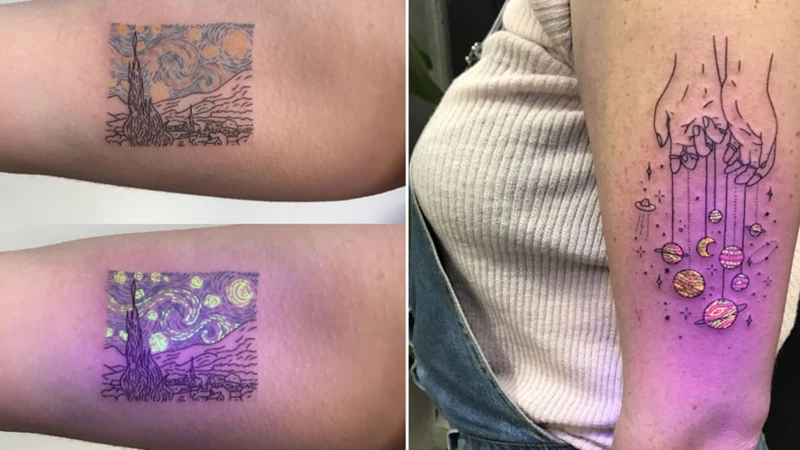
- Fading: Tattoos can fade over time due to exposure to sunlight and other environmental factors.
- Ink Quality: Lower-quality tattoo inks may not be as dark or vibrant as the ink used by professional tattoo artists.
- Improper Aftercare: Not following proper aftercare instructions, such as avoiding swimming or soaking the tattoo, can contribute to lightening.
- Incorrect Placement: Placing a tattoo in an area of the body that is more prone to fading, such as the hands or feet, can lead to a lighter tattoo.
- Thickness of Skin: Tattoos placed in areas with thicker skin, such as the back or chest, can appear lighter due to the increased level of ink absorption.
How to Care for Your Tattoo During the Healing Process
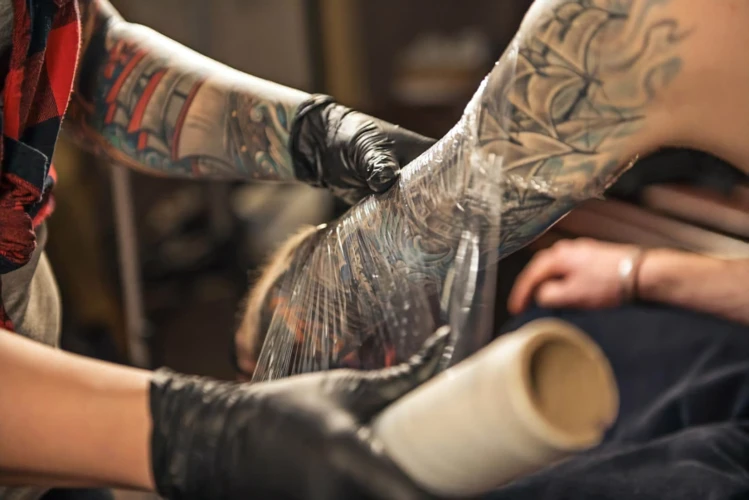
Day 1: Immediately after getting your tattoo, rinse it with lukewarm water and gentle soap to remove any excess ink and blood. Pat it dry with a clean, soft towel. Apply a thin layer of a fragrance-free, water-based ointment.
Days 2-3: Wash your tattoo with lukewarm water and a mild, fragrance-free soap. Keep the area hydrated with an ointment.
Days 4-7: Continue to wash your tattoo with lukewarm water and a mild, fragrance-free soap. Apply a light layer of a fragrance-free, water-based ointment.
Days 7-14: Wash your tattoo with lukewarm water and a mild, fragrance-free soap. Switch to a fragrance-free lotion for hydration.
Day 14 and Beyond: Wash your tattoo with lukewarm water and a mild, fragrance-free soap. Keep the area hydrated with a fragrance-free lotion. Avoid sun exposure and wear sunscreen if it is exposed.
What Can I Do If My Tattoo Is Lighter than Expected?
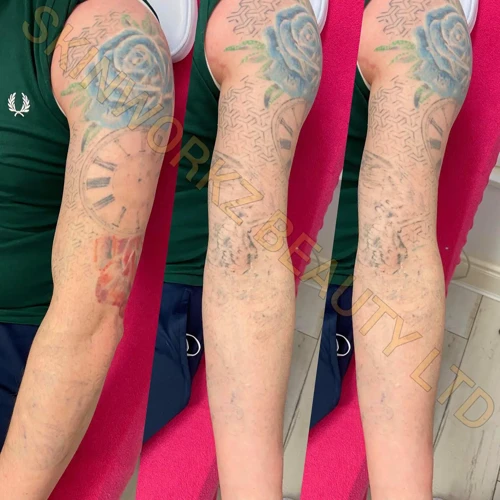
- Wait It Out: Patience is key. Your tattoo may still darken up to 6 weeks after the healing process is complete.
- Discuss With Your Artist: Ask your artist for advice as they know your skin and the ink used best.
- Touch-Ups: If you’re still unhappy with the results, your artist may suggest touch-ups or additional shading.
- Consult a Professional: If the touch-up does not fix the problem, you may need to consult a dermatologist or other medical professional.
Tattoos often look lighter than expected when they have just been applied. This is usually because the skin is still healing and the ink hasn’t had time to settle. But, if your tattoo is still light after the healing process is complete, then there are a few options.
The first and most important thing to do is to wait it out. It can take up to 6 weeks for the tattoo to fully heal and darken, so be patient. If you are still not happy with the colour after this time, discuss the issue with your artist. They may suggest additional shading or touch-ups.
If touch-ups do not help, then you should consult a medical professional, such as a dermatologist. They may be able to suggest a treatment plan to help darken the tattoo.
No matter what you decide to do, it is important to take care of your tattoo and follow the advice of your artist and medical professionals.
Tips to Ensure Your Tattoo Heals Properly
- Follow Aftercare Instructions: Your artist will provide clear instructions on how to care for your new tattoo and it is important to follow them carefully. This will help ensure that your tattoo heals properly and the colours stay vibrant.
- Keep It Clean: The best way to do this is to gently wash the tattoo with a mild, fragrance-free soap and warm water two to three times daily. Pat the area dry with a clean, soft cloth.
- Moisturize: During the healing process, it is important to keep your tattoo moisturized. Use a fragrance-free moisturizer, like an ointment or balm, to help your skin heal.
- Protect Your Skin: Keep the tattooed area out of direct sunlight and covered with clothing until it is fully healed. This will help protect the area from infection and keep the colours from fading.
- Be Patient: It can take up to two weeks for a tattoo to heal completely, so it is important to be patient and give your body time to heal. Do not pick at the scabs or try to remove them. This could lead to infection or damage to your tattoo.
When it comes to the question of will my tattoo get darker when it heals, the answer is that it is possible. However, proper aftercare is essential to ensure that the colours stay vibrant and the tattoo heals properly. If you follow the tips above, you can help ensure that your tattoo looks its best when it is finished healing.
Frequently Asked Questions
What Factors Influence Whether or Not a Tattoo Will Darken When It Heals?
- Tattoo Placement: Tattoos that are placed in more fleshy areas such as the arms, legs, and back may tend to darken more easily than tattoos that are placed in the more delicate areas of the body such as the face and neck.
- Age: Older tattoos generally tend to darken more than newer tattoos.
- Ink Quality: The quality of the tattoo ink used can also influence whether or not a tattoo will darken. Higher quality inks tend to darken more easily.
- Skin Type: The type of skin can also influence whether or not a tattoo will darken. People with lighter skin tones tend to darken more easily than those with darker skin tones.
- Aftercare: Proper aftercare is essential in order for a tattoo to darken properly. If the tattoo is not properly cleaned and moisturized, it may not darken as expected.
Are there any tips for preventing a tattoo from darkening when it heals?
Aftercare: Taking proper care of your new tattoo is the best way to ensure it will not darken when it heals. Make sure to follow your artist’s aftercare instructions and keep the area clean and moisturized. Avoid sun exposure, swimming, and soaking in hot tubs to further protect your skin. Tattoo products: Using a high-quality tattoo lotion or ointment can help to prevent darkening. Choose one that is free of fragrances, alcohol, and petroleum and that is specifically designed for tattoos. Long-term care: To prevent your tattoo from darkening over time, practice good sun protection habits. Wear sunblock and cover up your tattoo when spending extended periods of time outdoors.
Are there any signs that a tattoo may darken when it heals?
Yes, there are a few signs that a tattoo may darken when it heals. The first is the pigmentation of the ink used. Darker inks generally require more time to heal and will often darken slightly. Additionally, the location of the tattoo can affect the healing process. Areas with more skin exposure to the sun, such as arms and legs, are more likely to darken. Lastly, the age of the tattoo can also be a factor. Older tattoos are more likely to darken over time.
Is it normal for a tattoo to darken in some areas more than others?
Yes, it is normal for a tattoo to darken in some areas more than others. The degree of darkening will depend on the tattoo artist’s technique and the amount of ink used. Areas with thicker layers of ink will tend to darken more than areas with thinner layers. Additionally, certain colours may darken more than others, as some inks are darker than others.
Are There Any Methods to Lighten a Tattoo that has Darkened When It Healed?
Laser Treatment: The most common option to lighten a tattoo is laser tattoo removal, which involves using a high-intensity laser to break down the ink particles in the tattoo. This process is painless, but can be expensive and take several treatments to achieve the desired results.
Chemical Peels: Chemical peels are a less invasive option, but they can also be effective in lightening a tattoo. Chemical peels involve applying a chemical solution to the tattoo, which causes the top layers of skin to peel off, lightening the tattoo in the process.
Skin Bleaching: Skin bleaching products are another option to lighten a tattoo. These products contain ingredients such as hydroquinone, which can help to lighten tattoos. Skin bleaching can be done at home, but it is important to follow the instructions carefully to avoid any skin irritation.
Exfoliation: Exfoliation is another option to lighten tattoos. This involves using a gentle exfoliating scrub to remove the top layer of skin, which can help to lighten the tattoo. It is important to use a gentle exfoliant and to avoid over-exfoliating, as this can cause skin irritation.
Cover-Up Tattoos: Cover-up tattoos are a great way to lighten a tattoo without having to remove it entirely. A cover-up tattoo is a larger tattoo that is designed to cover up the existing tattoo. This can be a great way to lighten a tattoo without having to go through the process of having it removed.
Conclusion
Tattoos will darken after the healing process is complete. This is due to the body’s natural healing process, which causes the ink to become more visible. The degree to which a tattoo will darken depends on a variety of factors, including the type of ink used, the size and location of the tattoo, and the aftercare given. To ensure that your tattoo will not darken too much, it is important to select a reputable tattoo artist and to follow the aftercare instructions they provide.
References
- What You Need to Know Before You Get a Tattoo, Food and Drug Administration
- Will My Tattoo Darken After It Heals?, Verywell Health
- Tattoo Removal Program FAQs, Johns Hopkins Bloomberg School of Public Health